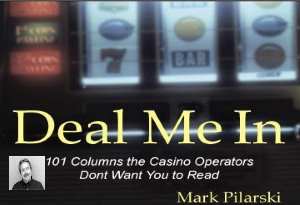Do you know of any “gray area” ways to prove gambling losses in order to deduct them from my taxes? I recently hit a decent size jackpot, but like most players, also lost my fair share over the past year. Unfortunately, I have no documentation. What I do have is records of my airfare, lodging, and meals from this past trip. Can I write off those expenses against my jackpot win? How about a fake diary of my gambling losses, or using losing keno and sports tickets found on the casino floor and trash cans? Charlie G.
Well, federal slammers have lots of gray areas, but accepting your query as you meant it, sorry, Charlie, to both of your recusant solutions. (If there were any dodge whereby losers bamboozle the IRS, would you expect to see it advanced in a nationally syndicated newspaper column?)
Let’s review: Expenses incidental to gambling, such as airfare, lodging, and meals are not deductible as losses. Such writeoffs are only deductible by professional gamblers (which you clearly are not, as a pro would have kept meticulous records) or by others who can show a direct business-expense link, such as a trade-show trip to Las Vegas.
As for your speculation that scouring trash bins for littered losing tickets might resolve your winning woes, FORGET IT. With the IRS expecting some form of documentation proving your gambling losses, it had better be Charlie G. who actually incurred those losses. The IRS has uncompromising-and some think unscrupulous-means of determining whether a gambler without any real losses has just created the appearance of loss with phony, handcrafted documents. It is therefore not advisable to try to fake, find, or forge losses. The best way to avoid problems with the IRS is to memorize and obey these six commandments, inscribed in gold leaf on the polished marble head of each IRS Commissioner when he is sworn in:
- ALL gambling winnings are technically taxable.
- Factual, verifiable records are necessary to support winnings and losses pertaining to gambling.
- Gambling losses are deductible only if deductions are itemized.
- Gambling losses are only deductible up to the amount won in the same year. Losses cannot be carried forward to later tax years. If deductible, they must be deducted in the year of the loss or they are forever unsalvageable as deductions.
- Gambling losses cannot be used to reduce other income. Gambling losses can only offset gambling wins.
- You must report the full amount of your winnings on line 21 and claim your losses as an itemized deduction on Schedule A.
So, what size jackpot will trigger traceable paperwork? According to Uncle Sam, the payer must issue you a W2-G form if your winnings are $600 or at least 300 times the amount wagered. This would be representative of winnings from dog racing, horse racing, and state lotteries. Casino winnings are treated slightly differently, as a W2-G must be issued and filled out by the casino if a bingo or slot machine win is above $1,200, or the net proceeds from a keno win are greater than $1,500.
Oh yeah, Charlie, one other thing. Now that you have won a jackpot and received a W2-G, don’t imagine you’ll somehow slither down the crack so that Sammy won’t know of your tax liability. The IRS also receives a copy of your W2-G from the casino, and the IRS computers know of your fortunate winnings before you can begin the celebration.
Because I am three college degree’s shy of giving more technical tax advice, for further tax questions I unhesitatingly advocate help from a competent tax expert.
Gambling thought of the week: “The pro’s primary objective is to win money. Enjoying himself in the process is a welcome, but not altogether essential, requirement.” -Don Schlesinger




















